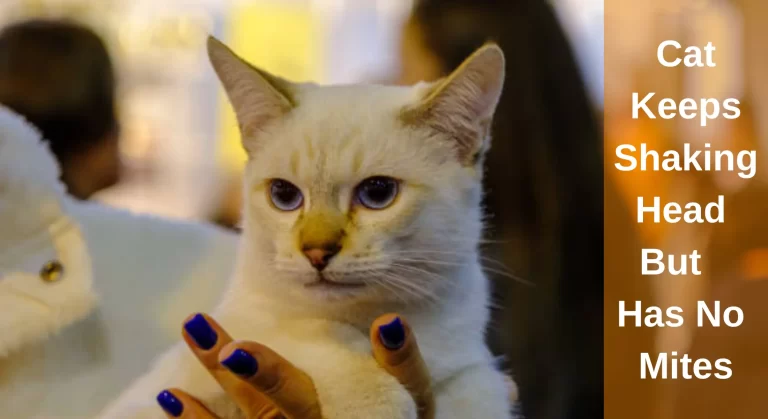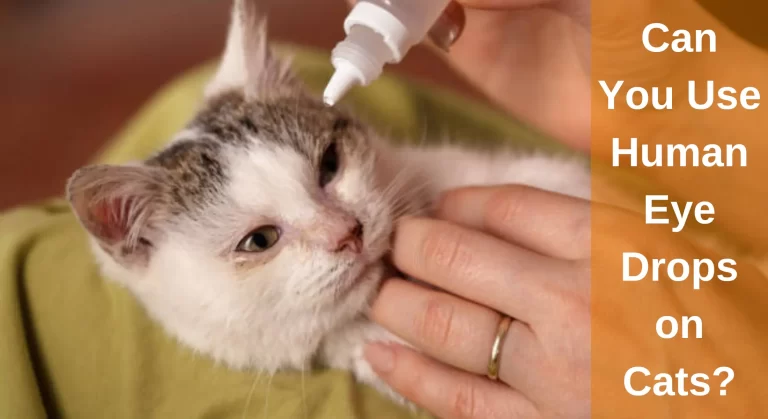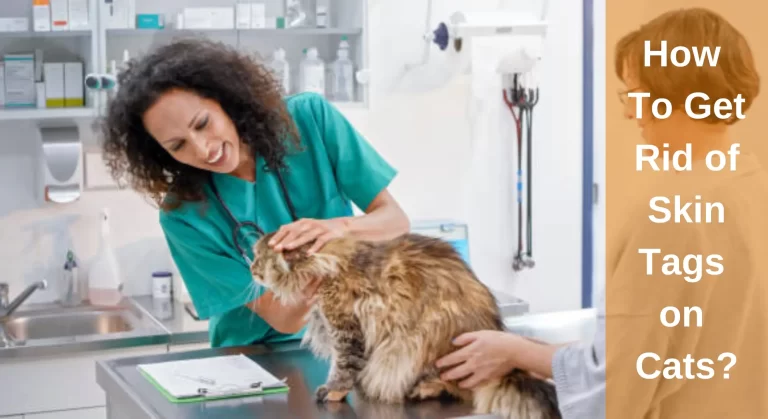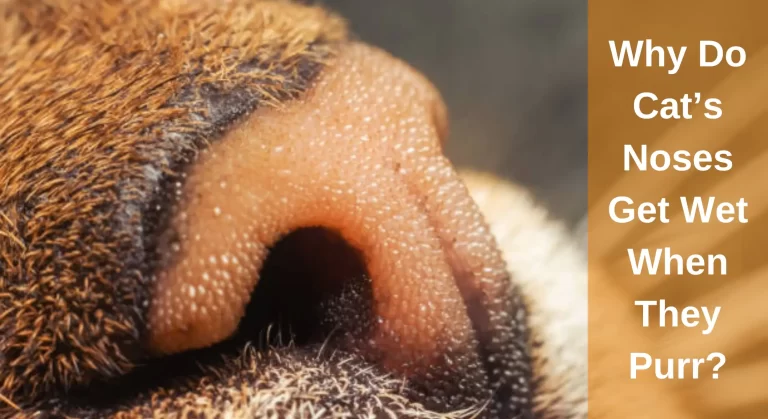Should I let My Cat Lick Its Wound? [Answered]
A cat’s tongue is gently barbed, as you may have seen or felt when the cat licked you. That tongue’s ability to pick up and eliminate dirt from its fur makes it ideal for cleaning. Everyone knows how crucial it is to keep a wound clean. Thus, licking offers benefits in that regard. Cat saliva also includes substances that help speed up the healing process. So should I let my cat lick its wound?
Cat saliva contains antimicrobial qualities that help with healing and recovery but also harbours dangerous pathogens. Saliva’s antiseptic properties are most effective on exposed wounds; nonetheless, they cannot replace the antiseptics or antibiotics that a veterinarian has recommended.
This article will discuss why and how to prevent your cat from licking its wounds and why it is best to keep your cat from licking its wounds. Read on to find out what you can do if your cat is getting wounds and you’re having trouble keeping them away.
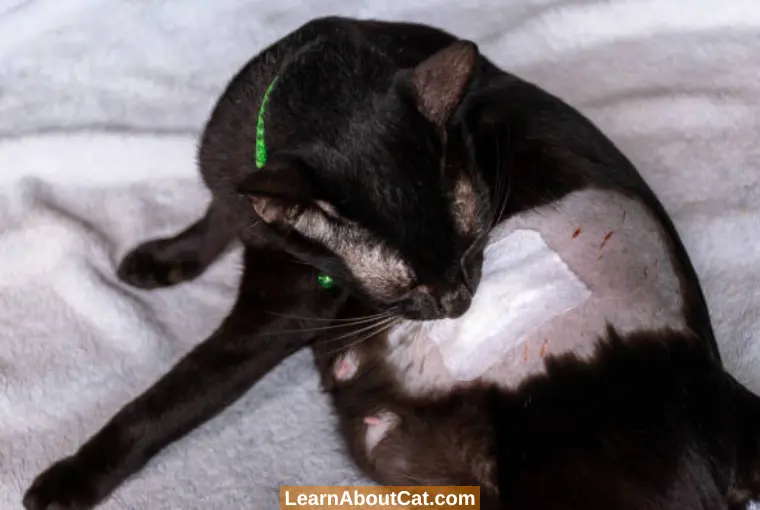
What Does Cat Saliva Contain? Chemicals in Cat Saliva?
Cat saliva essentially contains antibacterial qualities. It can, therefore, both eliminate dangerous germs as well as stop some of the worst bacteria from proliferating within your cat’s moutMouthe enzymes or chemicals are as follows:
- Peroxidase: a collection of enzymes that protects the body from dangerous microorganisms
- Lactoferrin: This protein has antioxidant and anti-inflammatory properties
- Lysozyme: This enzyme disrupts the cell membrane of bacteria
- Sialotonin: Sialotonin can help lower blood pressure since it exerts vasodepressor effects on the body.
- Defensins: an antibiotic produced by white blood cells in the body
Saliva from your cat contains antimicrobial qualities that can:
- Encourage healing
- Ease its suffering
- Remove microorganisms from the wound.
Why Do Cats Lick Their Wounds?
Do you remember the first time you sucked your finger after it was cut? You’ve probably noticed that it eases the pain and also stops the bleeding. Cats have lightly barbed tongues, as you’ve probably seen or felt when they lick you. A cat’s scratchy tongue is a great cleaner and excellent at picking up and removing debris from its fur.

Additionally, cats have the impulse to lick away blood to evade being found by predators. Although they are unlikely to face any threats from predators, it is in their DNA to defend themselves.
Cats may also attempt to clean a new wound by licking it. Unfortunately, this might endanger the healing process, so you’ll need to intervene and stop them.
Can Cats Saliva Heal Wounds?
Keeping a wound clean is important; licking is not always a harmful habit for cats. Several substances in cat saliva, including opiorphin, peroxidase, lactoferrin, and thrombospondin, have antimicrobial and pain-relieving properties.
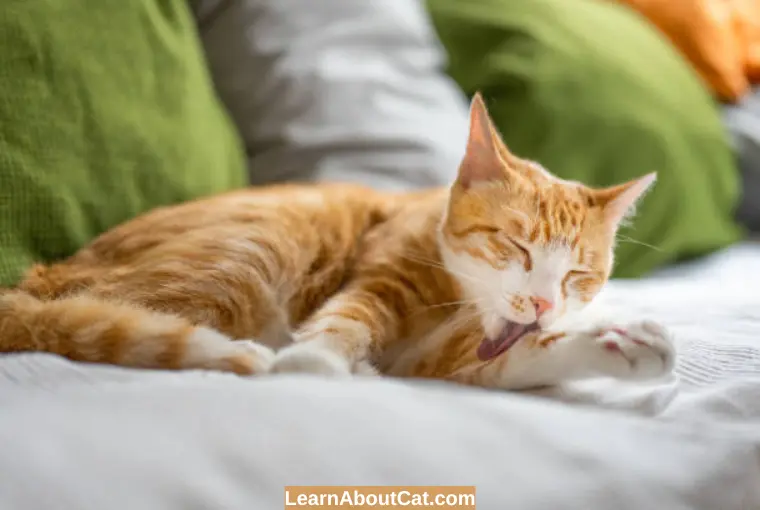
Although cat saliva can have some beneficial qualities, it is impossible to overstate the number of germs in a cat’s mouth. In fact, if your cat licks the wound too much, it could aggravate it.
Additionally, cat saliva does not help the wound to heal. Certain infections can be prevented by their antibacterial properties. They cannot, however, take the place of medical care. Before the wound becomes infected, treat your cat’s injuries yourself or have your veterinarian do so.
Your wounded cat may find comfort in licking its wounds. From this point on, it could become obsessive and potentially hurt the wound and the skin around it. There are techniques you may use to teach your cat to quit licking its wounds. You use a clicker and rewards to get your cat to ignore the injury.
Should I Let My Cat Lick His Wound?
The issue is that cats frequently lick excessively. Long-term discomfort may result from their licking themselves raw. If they are licking at stitches, they may be doing so to scratch an itch, but there is also a chance that they will undo the doctor’s good work and reopen the wound.
In addition, along with all the bacteria in cat’s are also dangerous microorganisms. A cat’s mouth bacteria could cause a skin infection, abscess, or even sepsis, which can be fatal. Your cat might worsen the injury by licking it, which is never a good idea.
Is It Bad For Cats To Lick Their Wounds?
The answer to that question depends on the type of wound your cat has received. Thus it cannot simply be answered with yes or no. The antibacterial qualities in your cat’s saliva can help with pain relief and remove any blood and filth from the site if it is an open wound.

If it is, your cat will begin licking it as first aid. On the injury, the saliva functions as a first salve or ointment. Additionally, a cat’s tongue possesses tiny barbs that help treat wounds by removing dirt.
However, it is OK if the cat licks the wound before you can treat it. It is still best to treat the wound personally and, if you can, bandage or cover it.
After that, always clean the wound and examine it daily for infections. If it does, the abscess might spread and become more severe. Veterinarian care is always required for a bump.
What is A lick granuloma?
Allowing your cat to lick its wound repeatedly might result in ongoing aggravation of the area and the skin around it. Cats lick their wounds because it helps them feel better.
When the wound gets inflamed from frequent licking and produces a raised border or plaque, the disease is known as a “lick granuloma.”
The granuloma may aggravate and grow more infectious, prolonging the healing process. The wound-licking behaviour might develop into a habit that your cat finds comforting if you do not stop it, at which point it will be tough to break.
Can My Cat Lick Its Abscess?
The term abscess refers to a pocket under the skin filled with pus; keep your cat from licking it. Excessive licking may cause the wound to reopen and potentially result in a lick granuloma. Compared to a superficial scabbed wound, this is a far worse situation.
Should A Cat Lick Its Open wound?
In order to prevent infection, any open wounds on your cat should be treated immediately. Your cat could lick the wound to do first aid on itself to remove dirt or blood around the wound.
Cat tongues are coated in tiny barbs to help clear out any material that may have gotten within the wound. It is still wise to attend to the wound yourself or to have your cat seen by a veterinarian. Even if your cat licks the exposed area, rinse it entirely before tying it.
Can Cats Have Bacteria in their Mouth?
Zoonotic bacteria are present in cats’ mouths; when a cat bites, these dangerous pathogens may spread from animals to people. According to studies, between 50 and 80 per cent of cat bites in humans become serious enough to seek medical attention.
The high levels of bacteria in cats’ mouths are primarily caused by the food they eat and the oral issues they might be experiencing.
How Do I Get My Cat to Stop Licking a Wound?
Cats are tenacious creatures, making it difficult to prevent them from acting in a certain way. What are some practical alternatives if you can’t convince your cat to quit licking its wounds? Let’s look at some excellent methods for preventing cats from licking.
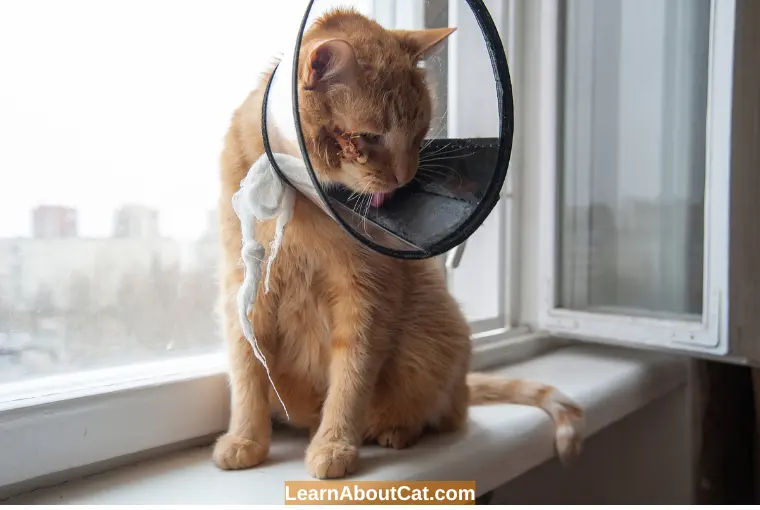
1. Bandages
To stop cat licks, consider bandaging the wound. Pre-made bandages or an old towel can be used to make the bandage. For the dressing to stay on, it should be wrapped loosely enough to avoid suffocating the wound.
Your cat could try to bite and lick the bandage. Thus it might not be possible to stop them with a bandage. Try a cat lick repellent if you want to go one step further.
These sprays coat the bandage and give it an unpleasant flavour, preventing your cat from putting its moutMouthr it.
2. Neck Collar
All animals that have recently had surgery or sustained an injury are frequently fitted with neck collars. These collars encircle the cat’s neck, making it more difficult for them to access the injured region.
Two common varieties of collars exist. The first resembles a lampshade and prevents them from getting close to the wound. Even if it works, it does take the cat a few days to become used to it.
The second option is a stiffer collar restricting the cat’s ability to swivel its head. They resemble a neck brace in appearance. Although they work well for most wounds, treating ones on the front legs isn’t recommended.
3. Utilise topical creams
There are various topical medications designed expressly to prevent cats from self-licking. These items generally have bad flavours. The sour taste will deter your cat from engaging in further action as soon as they begin to lick.
What Should I Do if My Cat is Wounded?
In the case of a small scratch, your cat will likely heal on its own, but if the wound is bleeding or has a bite or puncture, you should take him to a veterinarian right away. Your cat should be treated immediately if it has been bitten by another animal. The wound must be cleaned properly to prevent infection from bacteria from the other creature’s mouth. In many cases, antibiotics are prescribed.
You should apply a pressure bandage to the wound if it is bleeding freely until you can seek medical assistance. Otherwise, you can wash the wound gently with saline solution (one tablespoon of salt in one pint of tepid water). Avoid using antibacterial creams or disinfectants on your cat unless they are prescribed by your veterinarian, as they may worsen your cat’s wound and can poison it if it licks it.
How Should I Care for My Wounded Cat?
After your cat has undergone surgery or been injured, you should keep them indoors for at least a week – perhaps longer.
During your pet’s recovery, keep him calm, ensure that he receives nutritious food, and make sure he checks the wound site at least twice a day to see if it is bleeding, discharged, red, swelling, or reopening. In case of concerns, please contact your veterinarian immediately.
Frequently Asked Questions
What happens If a cat’s wound becomes infected?
Before the development of swelling and discomfort at the puncture site, the infection may go undetected for several days. The cat will frequently start to feel feverish at this stage. An abscess will occur if a pocket of pus forms around the incision due to loose skin.
Is it Ok for my neutered cat to lick his wound?
No, The region around the incision may not be licked in any way! After surgery, your pet must wear an E-Collar (plastic cone) for 7–10 days if they start to lick their incision. A pet may easily tear out sutures, which can do considerably more harm.
Does cat saliva contain an antiseptic that helps heal wounds?
There are antiseptic, antibacterial, and healing properties in cats’ saliva. Your cat’s saliva will heal its wound if it licks it and leaves it alone. On the other hand, cats’ tongues are filled with harmful bacteria, and if it keeps licking the wound, it is more likely to cause an infection than prevent it.
Should I let my cat lick my wound?
No, Keep your cat from licking your open sores. If a cat licks your wound, it can be dangerous for you; you might end up with cat scratch disease.
How do you know when a cat’s wound is healing?
Your body should experience the same thing after a cut or scrape, so you should recognize it. During the healing process, the wound will shrink or contract as granulation tissue fills up. The appearance of wet pink granulation tissue indicates an appropriate healing process.
Wrap Up!
Although our cats believe they can care for themselves, we are their guardians and must act to keep them safe. Although it may be tempting to let them do as they want, your monitoring is essential for promoting wound healing and restoring them to normal.
Related Posts:
Who is Isabella?
My name is Isabella, and I am a dedicated and knowledgeable cat enthusiast. With years of experience caring for cats and a deep love for felines, I made a mission to help other cat lovers navigate the challenges of cat ownership.


